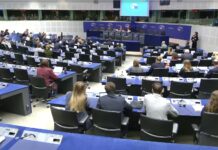Cultural diversity is the heart and soul of the European Leadership Program (ELP), making the experience of each fellow rich and vibrant. Surrounded by a mix of traditions, perspectives, and lifestyles is fascinating and helps us learn and grow together. We quickly realise that our differences—often hilariously highlighted in our debates in the kitchen—lead us to find shared values that bring us closer.
One of the most entertaining aspects of our cultural diversity comes out during meal times. Each meal turns into a cultural exchange, with everyone bringing their unique culinary traditions to the table. The Italians, with their deep love for food, often steal the show. Their dedication to using quality ingredients, their meticulous cooking methods, and their joy in sharing food become a delightful spectacle. I, for one, unfortunately very often dishonour this proud culinary heritage through my deep affection for frozen pizza after a tiring workday. It’s a fun reminder of how food can be a powerful way to share a piece of one’s culture.
But our diversity goes far beyond what we eat. It includes a wide range of cultural practices, languages, and viewpoints. This variety creates an environment where we are constantly learning from each other and adapting. Being around such a diverse group pushes us to think differently and broadens our perspectives, making us better problem-solvers and leaders. A good example is when we organised a so-called “Visegrad dinner,” trying to immerse the other Fellows into the rich and diverse cultural heritage, culinary delights, music, and traditions of our countries. By cooking food from our countries, I could see the honest interest and affection of the other Fellows, trying to ‘piece together,’ and understand a part of our identity, through the options we offered them.
Even with all these differences, we find that we share core values that connect us. Respect, empathy, and a desire to make a positive impact are universal among us. These shared values are what make it possible for us to work well together, despite coming from different backgrounds.
The experience of working together in the ELP shows us just how important it is to embrace cultural diversity. Instead of seeing our differences as barriers, we see them as opportunities to grow. For example, when working on projects together, the mix of perspectives often leads to more creative and effective solutions. Seeing a problem from various angles, influenced by different cultural contexts, sparks innovation and leads to better results.
The friendships we form through ELP are also deeply enriched by this diversity. Sharing our stories and traditions helps us build strong bonds of understanding and respect. These relationships are grounded in our common human experiences, like the pursuit of knowledge, the need for connection, and the drive to make a difference in the world.
At the end of a Speaker’s night, a Slovak would probably have a different “geopolitical” question than a Mexican, although when it comes to more personal questions, we all aim for similar goals: finding our perfect vocation, a purpose, being appreciated and respected, and spending meaningful time with our closed ones. These are the goals and affections that make us humans after all.
In the end, the European Leadership Program is a perfect example of the beauty and importance of cultural diversity. While our differences can be most humorously seen in our kitchen escapades—especially with the Italians’ culinary pride—they are also what make us stronger together. The shared values we discover help us cooperate and succeed as a team. By celebrating our differences and recognizing what we have in common, we create a dynamic and inclusive environment that prepares us to lead with empathy and insight in today’s interconnected world.
So eventually during our kitchen adventures, should we choose pasta or goulash? Let’s compromise on waffles.
Daniel Lakatos
ELP 11th cohort Fellow





